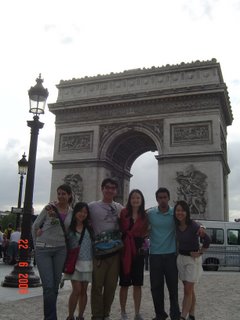British authorities came under criticism earlier this month following the June 2 raid in Forest Gate. To recap: two brothers had been suspected of building a chemical bomb designed for terror purposes. Neither weapon nor traces of terrorist activity were found.
Botched security measures are nothing new to British authorities. The Sunday Times reported yesterday that British police had in fact been fore-warned about last year’s July 7th attacks. Previously, official statements with regards to the London bombings had declared the attacks as totally unexpected. Check it out here and here.
It has now been confirmed that Mohammad Sidique Khan, leader of the London bombers, had been “monitored and tape-recorded over a period in 2004”. An electronic tracking device (planted by Special Branch officers to monitor suspected terrorists) was recovered from Khan’s car.
Computer expert Martin Gilbertson has also alleged that he had warned police about “suspicious activities” by Khan and one of his accomplices Shehzad Tanweer. Gilbertson described to The Sunday Times how he helped produce anti-Western videos and came into contact with radical Islamists including Khan and Tanweer at his workplace.
The revelations of British authorities having prior intelligence to the plans of the London bombings is just another badge of dishonour to be added to their list of incompetencies along with the botched Forest Gate raid and the accidental killing of Jean Charles de Menezes.
Not too long ago, Simon Jenkins wrote a convincing piece partly in defence of British security forces. His basic message: Being paranoid about everything is making things worse. He urged the public to rekindle its trust for the police force as it should accept a certain degree of danger so as to “maintain freedom of speech, movement and civil liberty in Britain”. With tougher security measures there will necessarily be tradeoffs in terms of the erosion of civil liberties and individual privacy as well as further increases in bureaucracy.
The informational gap between what technology-savvy criminal and security analysts have access to compared to the general public has been greatly reduced due to the conveniences of the World Wide Web. Previously, people merely accepted authorities’ failed security measures. However, due to today’s narrowing informational gap it is a sad convenience that we now are able to question, blame and condemn the police for not being able to predict the future.
Tuesday, June 27, 2006
Monday, June 26, 2006
Adventures in France
Tao and I had lunch here. It's this place in Bordeaux which was featured on Rick Stein's TV show.

Danu, Hasnain and I. Hasnain was really excited about climbing up this 200-step tower. If I remember correctly, it was part of the Church of St Andre in Bordeaux.
Ning, Viv, Ming, Nicole and I having a cheap set menu dinner in Bordeaux (again).
 Nicole, Emily and I at a really good French bistro called Polidor in Paris.
Nicole, Emily and I at a really good French bistro called Polidor in Paris. Check out the flower-shaped ice creams we had at Amorino in Paris.
Check out the flower-shaped ice creams we had at Amorino in Paris.
 Danu, Emily, Tao, Hasnain, Ning and I at the Arc de Triomphe in Paris.
Danu, Emily, Tao, Hasnain, Ning and I at the Arc de Triomphe in Paris.
Thursday, June 08, 2006
Exams Are Over!
There’s been a lot of buzz about who the contenders for the 2008 US presidential seat will be. The media started of initially by pitting current Secretary of the State Condoleezza Rice against the former first lady Hillary Clinton. It makes a really good story –something the masses would enjoy. Two women, one Republican the other Democrat, competing to be the most powerful and influential person in the world (excluding Paris Hilton, Lindsay Lohan and Dan Brown of course).
In April, Vanity Fair released its first ever “green issue” which focused specially on environmental matters. An A-List Green Team made up by Robert F. Kennedy Jr, Julia Roberts, George Clooney and Al Gore appeared on the magazine’s cover. At the Cannes Film Festival in May, Al Gore made waves thanks to a documentary based on the former US vice-president’s environmental campaigning titled An Inconvenient Truth.
A presidential race between Ms Rice and Mrs Clinton would be an interesting one. Regardless of who wins, the situation would surely be a triumph for women’s rights activists everywhere. A more interesting race to monitor would be the one among Democratic ranks with regards to the party’s presidential nominee.
In a speech delivered at the National Press Club in Washington, Clinton called for Americans to make changes in the face of Iraq war and high petrol prices. Gore on the other hand, has been relatively low-profile compared to Hillary Clinton amidst his environmental campaigning.
However, with all the talk about environmental degradation lately, it may not be too late to write him off as a potential 2008 nominee. At least he distances himself further from the Bush administration compared to Hillary Clinton (he is anti-war while Clinton supported the war).
Undoubtedly, the environment hardly invokes as much passion and nationalistic pride among the American public compared to a central national issue like Iraq and oil.
It is likely that if Clinton triumphs, there are bound to be certain policy changes which will favour gender equality (although it may not be marketable for her to admit that). If Gore wins, these policy changes will favour environmental awareness and protection. If being president means being able to leave a legacy on the American public then I would probably favour the tree hugger.
In April, Vanity Fair released its first ever “green issue” which focused specially on environmental matters. An A-List Green Team made up by Robert F. Kennedy Jr, Julia Roberts, George Clooney and Al Gore appeared on the magazine’s cover. At the Cannes Film Festival in May, Al Gore made waves thanks to a documentary based on the former US vice-president’s environmental campaigning titled An Inconvenient Truth.
A presidential race between Ms Rice and Mrs Clinton would be an interesting one. Regardless of who wins, the situation would surely be a triumph for women’s rights activists everywhere. A more interesting race to monitor would be the one among Democratic ranks with regards to the party’s presidential nominee.
In a speech delivered at the National Press Club in Washington, Clinton called for Americans to make changes in the face of Iraq war and high petrol prices. Gore on the other hand, has been relatively low-profile compared to Hillary Clinton amidst his environmental campaigning.
However, with all the talk about environmental degradation lately, it may not be too late to write him off as a potential 2008 nominee. At least he distances himself further from the Bush administration compared to Hillary Clinton (he is anti-war while Clinton supported the war).
Undoubtedly, the environment hardly invokes as much passion and nationalistic pride among the American public compared to a central national issue like Iraq and oil.
It is likely that if Clinton triumphs, there are bound to be certain policy changes which will favour gender equality (although it may not be marketable for her to admit that). If Gore wins, these policy changes will favour environmental awareness and protection. If being president means being able to leave a legacy on the American public then I would probably favour the tree hugger.
291206


